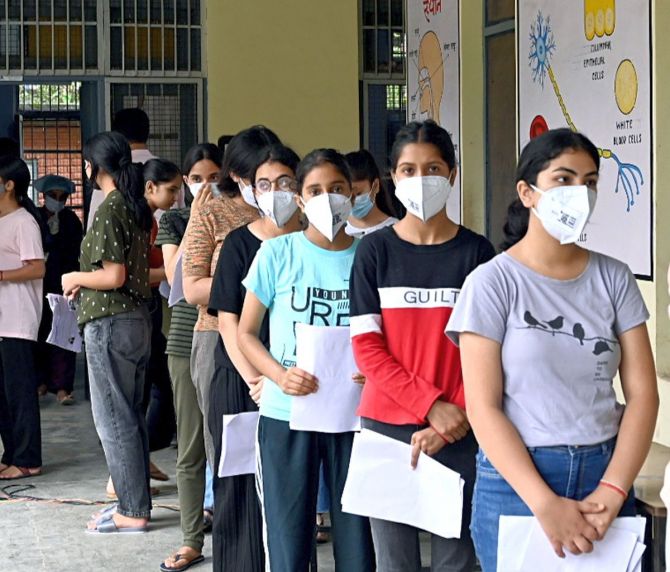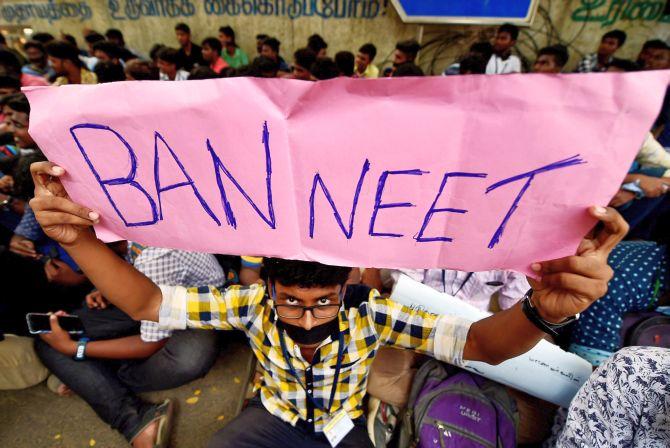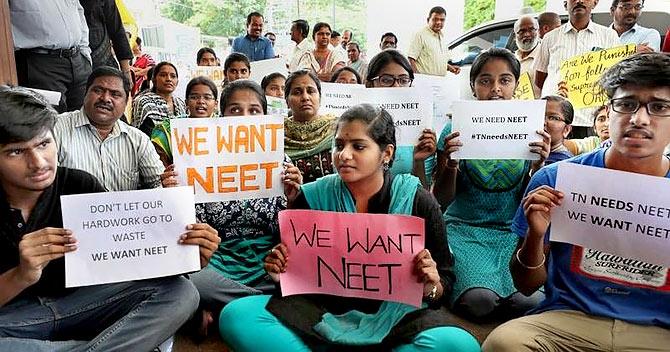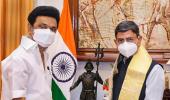As the petition points out, new medical colleges entail adjunct government hospitals, thus making specialised medical care that much more accessible to the vast majority of population that otherwise could not afford high-cost medical care in the private sector, N Sathiya Moorthy points out.

Now that the Tamil Nadu government has moved the Supreme Court, arguing that NEET 'violates the basic structure, equality and federalism', the first test would be to see how many other states or organisations file enjoining petitions, particularly sharing those views.
Of course, this step would have to await the Supreme Court deciding on the 'admissibility' of the Tamil Nadu plea, especially in the light of the fact that the federal legislation in the matter flowed only from a judicial verdict -- though technically, the two are stand-alone affairs.
The other caveat about the possibility of the Supreme Court to ask Tamil Nadu to wait, watch and come back again, if needed, flows from state Health Minister Ma Subramaniam's public admission that they were in communication with their counterpart at the Centre.
After the government had moved the court, citing the Centre as among the respondent, the minister said the state government had responded to one set of queries from the Centre, and was preparing the responses for a second questionnaire.
Thus, if the court issues notice, the Union Ayush ministry may refer to the pending communication, and submit that the Centre, acting for and through the President, had not taken any decision on the Tamil Nadu Bill, one way or the other, for the state to move the court.
The state government, if it came to that, may then point to the history of this bill and also two earlier ones, both passed during the tenure of the previous AIADMK government, and argue how successive governors, acting again for the President of India, had not been helpful in the matter.
In particular, the state may mention the case of incumbent Governor Ravindra Narayana Ravi, who sought and obtained clarifications twice, but both after long delays, when his job in the matter was only to forward the same to the Centre.
Incidentally, after the governor returned the bill to the state assembly for re-consideration, the House passed it again, which is a rarity.
In doing so, the assembly displayed a rare gesture of unity, as on earlier occasions in the matter, with only the BJP abstaining -- not instead staying back and voting against the bill.
As state ministers, including Chief Minister M K Stalin, have said many a time, the Tamil Nadu law was seeking to reverse an existing central law, thus requiring the assent, not of the governor but only of the President.

In the current petition, the state government has asked the Supreme Court to declare 'the marks obtained in the NEET will be the criterion for admission to medical and allied courses as ultra vires the provisions of the Constitution of India, violative of the basic structure of the Constitution, and are manifestly arbitrary as being violative of Article 14 of the Constitution', the last one conferring 'equality of law and equal protection of the laws' for all citizens.
In doing so, the petition submits how the government was constrained to approach the court as the 'introduction and continuance of the NEET exam has adversely affected the students ... in particular students from rural areas and students from Tamil Nadu State Board of Education affiliated schools'.
In the 'Statement of Objects and Reasons' pertaining to the 'Tamil Nadu Admission to Undergraduate Medical Degree Courses Bill, 2021', the government quoted from the one-member Justice A K Rajan Committee report, constituted for the purpose, to argue how rural students, especially from government schools (implying their financial incapacity) could not afford private coaching for NEET exams when nearly 400 centres had made a total of Rs 5750 crores, or even more.
In context, the Tamil Nadu petition has also sought a declaration that the Supreme Court's verdict in the 'CMC case' (Christian Medical College, Vellore & Ors v Union of India & Ors) was not binding on it in so far as it upholds the applicability of NEET for admission to government seats in Tamil Nadu.

That is also the crux of the matter, as the state government has sought to draw a line between private medical colleges and government colleges, and also 'government quota seats' in private colleges, as if to disprove politically-sensitive charge that medical colleges in the state were owned by politicians and capitation fee and 'management quota' seats were a bane on the quality of medical education as a whole.
In extension thereof, the state government's petition has also found fault with the central scheme which has imposed entry-level restrictions, in the name of quality-control, through NEET -- and how in doing so replicated the school-leaving exam marks through the entrance test.
It submits, how, instead, the state government's system evaluated the students at the exit-point for them to be rendered eligible to become medical doctors, and how those schemes were formulated under the guidelines and supervisions of central authorities such as the National Medical Commission, earlier Medical Council of India and also the University Grants Commission.
Incidentally, Tamil Nadu was the first state in the country to create a medical university to give specialised attention to medical education, which was gaining greater importance and relevance, owing to the policy decision to set up at least one government medical college in every revenue district -- whose numbers were increasing by the year, owing to a policy of ensuring easy access to public services.
Incidentally, it is one of the policies that have not changed with the change of Dravidian rulers, over the past three decades or so.
As the petition points out incidentally, new medical colleges entail adjunct government hospitals, thus making specialised medical care that much more accessible to the vast majority of population that otherwise could not afford high-cost medical care in the private sector.
With the result, Tamil Nadu today has the Scandinavian standard of four doctors per thousand population, the highest in the country.
In context, the Supreme Court petition submits while medical graduates from urban backgrounds decline to work in rural hospitals, NEET for post-graduate education in the state has dis-incentivised the grant of additional marks for doctors working in government hospitals for the purpose.
According to the A K Rajan report, in the years to come, NEET, if continued, could lead to a situation when government hospitals in Tamil Nadu's villages (and possibly even in urban and semi-urban centres) would run short of medical doctors, at all levels.
What critics of NEET claim the report and the government have not said is that such a downturn in public health availability in the state could put the clock back by years and decades.
Unlike often believed, it won't even help the high-cost private sector as the poor and even the middle-class cannot afford them, now or later.
This is apart from the fact that even the government-funded health insurance scheme of the past years has not been able to fill the gap, which is just now non-existing for most parts but may not remain so for long.
N Sathiya Moorthy, veteran journalist and author, is a Chennai-based policy analyst and political commentator.
Feature Presentation: Rajesh Alva/Rediff.com










